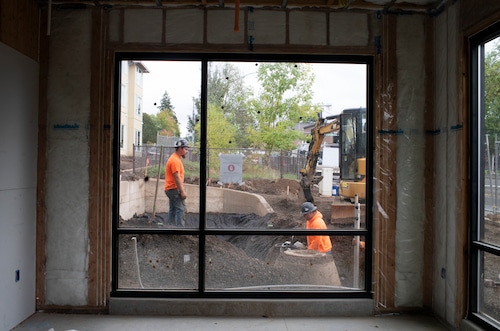Metro Chief Operating Officer Marissa Madrigal proposed using unanticipated funds from the region’s homeless services tax to build more housing during a Metro Council meeting Tuesday.
The Metro supportive housing services tax, designed to fund supportive housing, eviction prevention and mental health and addiction treatment, could generate $123 million in unexpected funds this year, according to projections from Metro.
The regional government now expects the tax to bring in $357 million this year, up from an initial estimate of $234 million. The projections for future years have increased as well.
Madrigal proposed using that extra cash for home construction, specifically to build more affordable housing for low- and moderate-income households and workforce housing.
Voters approved a Metro housing bond in 2018 to fund affordable housing but all that money will soon have been allocated, Metro officials wrote. Madrigal said that still more money is needed for the region to reach its building goals.
“More funding is critical to mitigate the current housing crisis,” she said.
Since Madrigal believes voters won’t support another new tax measure, she suggested dipping into the homeless services funds to fill in the gap.
Voters approved the 10-year homeless services measure, including its tax on high-income earners and big businesses in Multnomah, Washington and Clackamas counties, in May 2020. Counties began receiving money from the tax in July 2021.
Madrigal said she doesn’t believe using the extra funds to build housing would impact the three counties’ spending plans because the counties “are struggling to spend current funds and because this is unexpected revenue.”
It is not clear, however, that Metro would be allowed to use the homeless services money for construction without asking voters for permission.
Language on the ballot said the money would be for “supportive housing services to prevent and reduce homelessness,” with priority given to services “to address needs of people experiencing, or at risk of, long-term or frequent episodes of homelessness.”
The full text of the measure specified that “supportive housing services include case management services, mental health care, addiction and recovery treatment, employment services, rent assistance and other care as needed.” It never mentioned capital projects.
Adam Brown, Clackamas County deputy director of health, housing and human services, said the county believes voters intended the funding to go to certain kinds of capital projects.
“We understand the flexibility of the (tax money) to already include capital investments to end homelessness such as permanent supportive housing,” he said.
He said Clackamas County is already discussing the possibility of using the money to build housing for vulnerable residents who have complex physical health, mental health and substance use-related needs.
“We are available to sit down with Metro to find better and more effective ways of meeting our shared goals,” Brown said. “The revenue that has accumulated as we have been building up our system certainly presents additional opportunities to both meet critical community needs now and to sustain these programs over time.”
Multnomah County Chair Jessica Vega Pederson said every avenue to solve the homelessness crisis should be explored.
“I will not rule out any proposals that can help address it,” Vega Pederson said.
Multnomah County has successfully used its funds to help many people move off the street and into housing, she said. With the end of some federal funding and one-time dollars that helped the county address homelessness, Vega Pederson said she wants to first make sure there are enough tax funds to continue that life-saving work before looking at any new proposal.
Washington County Commissioner Pam Treece said the county needs to learn more about Metro’s proposal before taking a stance on it. After taking time to create a new foundation during the first year of funding, he said Washington County began allocating its funds more quickly in 2023, spending 97% of its budget. It’s on track to do the same this year, she said.
“We have used (the tax funds) to build a new system of care quickly and purposefully designed to serve our community members who experience or are at risk of homelessness,” Treece said.
Metro Council President Lynn Peterson didn’t express opposition to the proposal, but said she would want to be sure that diverting the funds wouldn’t derail counties’ progress on reducing homelessness and providing services to people living on the streets.
“We have three counties working very hard to build new programs over the last two years and knowing the programs won’t be fully grown for another few years,” Peterson said.
She and Metro Councilor Christine Lewis also questioned how Metro could reliably fund housing projects with revenue that could change each year based on fluctuations in the economy.
But Peterson agreed with her colleagues that something needs to be done to fund more housing construction.
“I am hearing two messages from the public,” she said. “I am hearing grave concerns about more taxation. … And I am hearing grave concerns about housing and homelessness, so we have to figure out how to address both at once.”
The other five Metro Councilors present at the meeting said they supported creating a task force to study the suggestion.
“We all know housing is a major challenge,” said Metro Councilor Duncan Hwang. But he added that he wants to make sure that all parties involved agree on how to spend the extra funding. “It is a challenge, but we have enough smart folks to pull together at the table.”
Nicole Hayden reports on homelessness for The Oregonian/OregonLive. She can be reached at nhayden@oregonian.com.
